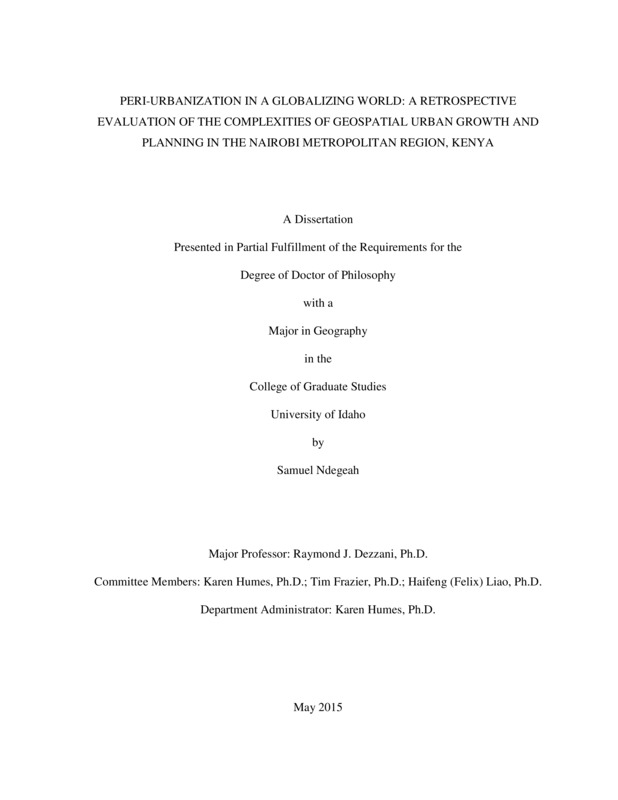PERI-URBANIZATION IN A GLOBALIZING WORLD: A RETROSPECTIVE EVALUATION OF THE COMPLEXITIES OF GEOSPATIAL URBAN GROWTH AND PLANNING IN THE NAIROBI METROPOLITAN REGION, KENYA
Ndegeah, Samuel. (2015). PERI-URBANIZATION IN A GLOBALIZING WORLD: A RETROSPECTIVE EVALUATION OF THE COMPLEXITIES OF GEOSPATIAL URBAN GROWTH AND PLANNING IN THE NAIROBI METROPOLITAN REGION, KENYA. Theses and Dissertations Collection, University of Idaho Library Digital Collections. https://www.lib.uidaho.edu/digital/etd/items/ndegeah_idaho_0089e_10500.html
- Title:
- PERI-URBANIZATION IN A GLOBALIZING WORLD: A RETROSPECTIVE EVALUATION OF THE COMPLEXITIES OF GEOSPATIAL URBAN GROWTH AND PLANNING IN THE NAIROBI METROPOLITAN REGION, KENYA
- Author:
- Ndegeah, Samuel
- Date:
- 2015
- Embargo Remove Date:
- 2016-08-14
- Keywords:
- Agglomeration and globalization Formal and informal institutions Land tenure systems Nairobi Metropolitan Region Peri-urban area Sub-Saharan Africa
- Program:
- Geography
- Subject Category:
- Geography; Sub Saharan Africa studies; Area planning & development
- Abstract:
-
Urbanization in Sub-Saharan Africa is inevitable. However, Western theories of the urban spatial structure have not adequately explained the patterns and processes of urbanization in the region. Remote Sensing and Geographic Information Systems techniques capture the patterns of change, but not the underlying institutional structures driving peri-urban growth through time and across space. The study uses a combination of extensive literature review, quantitative and qualitative data, and remote sensing and GIS techniques to identify and account for the past and current geophysical and societal structures influencing the spatial patterns of land use and cover change, and development in the Nairobi Metropolitan Region. The study found that the region’s spatial patterns show uneven temporal and directional variations as a result of many forces that combine in a complex and often subtle ways. The patterns are a result of the conjuncture of the customary, colonial, statutory, socio-political and economic processes. Indeed, Kenya’s and Nairobi’s development and urbanization are intertwined. The two are like conjoined twins; always together and hard to separate. There are three distinct phases of change. The colonial period, before 1963, that was characterized by segregation and restrictive colonial policies in land access and use. The national phase (1963 – 1980), dominated by a series of policy documents and economies of scale and agglomeration. More recently the global phase, after 1980, influenced by a new set of structures driven by increased globalization and the changing political economy. The peri-urban growth bears the inscription of the societal processes particularly about land access and use. The many years of colonial policies – many reinforced since political independence – have developed the peri-urban societies and production systems. The study also found that there is an increasing emphasis on the application of legal property rights and a lack of recognition of the persistence of customary land tenure in peri-urban land use planning. The emphasis on using a one-size-fits-all approach to development planning questions the conventional wisdom that these rights are the cornerstone of successful socio-economic development. It has led to increased peri-urban land use conflicts and informality and intensified environmental degradation. The approach cannot easily be generalized to areas operating in different socio-economic, political and ecological contexts. Because statutory regulations (rules in the form) often differ from what happens on the ground (rules in use).
- Description:
- doctoral, Ph.D., Geography -- University of Idaho - College of Graduate Studies, 2015
- Major Professor:
- Dezzani, Raymond J.
- Committee:
- Frazier, Tim G.; Liao, Haifeng (Felix); Humes, Karen S.
- Defense Date:
- 2015
- Identifier:
- Ndegeah_idaho_0089E_10500
- Type:
- Text
- Format Original:
- Format:
- application/pdf
- Rights:
- In Copyright - Educational Use Permitted. For more information, please contact University of Idaho Library Special Collections and Archives Department at libspec@uidaho.edu.
- Standardized Rights:
- http://rightsstatements.org/vocab/InC-EDU/1.0/

